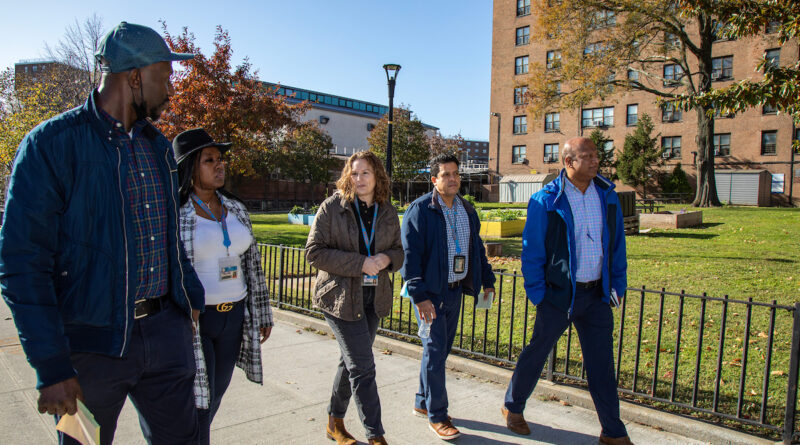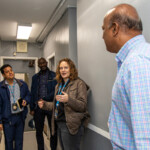Meet Eva Trimble, NYCHA’s Chief Operating Officer
Eva Trimble was appointed NYCHA’s Chief Operating Officer (COO) in July 2022. She was previously the Authority’s first-ever Executive Vice President for Strategy and Innovation, a role in which she led efforts to develop and implement the Transformation Plan to strengthen our organization and the ways we serve residents. Read on to learn more about COO Trimble and her plans for continued progress at NYCHA.
How did your work as Executive Vice President for Strategy and Innovation, especially your involvement in the Transformation Plan, prepare you for your role as Chief Operating Officer?
I have spent the last three years listening to residents and employees and analyzing NYCHA’s operations to help create a strategic vision for an improved NYCHA. The Transformation Plan work allowed me to become familiar with nearly all aspects of our operation and understand many of the challenges and limitations we face. It also allowed me to lead the discussion around how we overcome those challenges and remove limitations to improve service delivery. After participating in the planning work, I am excited to now lead the implementation work from the position of Chief Operating Officer.
How does the Transformation Plan relate to our day-to-day work?
The Transformation Plan is our day-to-day work. This is not a separate initiative that requires us to stop what we’re doing – the Transformation Plan is a roadmap for all of NYCHA to improve service delivery for residents. That includes both Operations improvements as well as Central Office improvements that support Operations.
What are the most critical issues impacting NYCHA’s operations and how do we address them?
Setting aside the condition of the buildings, which is clearly the largest operational issue, then I would say that staff morale and training are critical issues as we attempt to improve operations. COVID set back training efforts significantly and we have not recovered. We also need to focus training on staff development. We are now working with the Strategy & Operations and Learning & Development teams to develop a comprehensive training plan for 2023. Regarding morale, there is so much good work happening across NYCHA, and I want to recognize those accomplishments and model that behavior through new recognition programs. I am working with Employee Engagement to plan some recognition events this year.
What are your short- and long-term goals as COO?
Short-term goals are to focus Operations on a “back-to-basics” theme: cleaning buildings and grounds, collecting rent and processing annual reviews, and walking the properties and responding to conditions like every day is a PHAS/REAC [HUD inspection] day. Long-term goals include implementing the Transformation Plan roadmap but also moving past that map to further improve services. For instance, now that Work Order Reform is live in all boroughs, we want to evaluate how it’s working and ensure that we continue to improve.
How can we better serve residents?
Our residents deserve respect and responsiveness. We cannot operate ourselves out of a $40 billion capital gap, but we can, and must, maintain clean grounds and buildings and show up when we say we’re going to show up to make repairs. The capital needs of the buildings are a huge challenge and many of our residents are living in severe conditions. Therefore, our priority in Operations is to serve residents with respect and be responsive to their needs. A repair request may return due to an underlying condition that requires capital and, if so, we’ll show up again and repair again.
What does it mean to you to be the first woman serving as NYCHA’s Chief Operating Officer?
NYCHA’s workforce is so diverse, but when I go to properties and meet with employees, I see we all share a common purpose – to do better for our residents. My goal as COO is to channel that purpose and passion to achieve our transformation. Our shared optimism can untap potential if each person believes they can make a difference, and I believe that to be true. I am in this position today because in every prior position I held I sought to make the change I wanted to see happen. If every housing assistant working on an annual review, and every maintenance worker responding to a repair, and every caretaker pulling compactor bags understands they play a critical role in changing NYCHA, then I know we can transform for our residents. I plan to make as much time as possible to visit staff at their work locations and remind them of their power for change.
What is most gratifying to you about our work at NYCHA?
It is gratifying to know that the work we do has a direct impact on people’s lives. I strive to make those impacts positive – we should be the answer to people’s problems, not the cause. NYCHA is the most critical affordable housing resource in NYC and creates stability for hundreds of thousands of families as well as communities across the city. Improving NYCHA’s service to residents and housing conditions can lead to improvements in residents’ health and economic well-being. I am confident that we can begin to solve problems and create more positive impacts, and I am optimistic for the future of NYCHA and our residents.
What’s most challenging?
The most challenging part about our work is the condition of our buildings. The Operations teams work so hard for our residents; yet, despite so many positive efforts, we often can’t keep up with or keep ahead of the deteriorating conditions. Repairs in one part of a pipe in one resident’s home often lead to breaks somewhere else in the pipe and in someone else’s home. This can make the job feel overwhelming for our staff. That’s why I am trying to focus on optimism – between our operational improvements and the increased capital investments that are planned and in progress, I know that we can start to get ahead and make an impact.
What’s the most valuable feedback you’ve received from a NYCHA colleague or resident?
Chief Operating Officer is a big job; someone recently compared it to the conductor of an orchestra, and that analogy really struck me. The Operations team is really strong, and I’ve enjoyed getting to know and work with the senior/executive team members in the last few weeks. I seek to make my contribution to this team a valuable one, to support them and help them deliver the professional and quality service that I know they are all committed to delivering. I hope I can keep us all working together in the same direction – on the same notes – because that is how we will accomplish the most for our residents.
Before joining NYCHA, you spent 10 years at HPD (the NYC Department of Housing Preservation and Development). What inspired you to devote your career to City government?
September marked 22 years with New York City government. I have always wanted to work for NYC government specifically. My dad was a DOT bridge engineer and my mom a DOE school teacher, so “the City” was always an aspect of my life. My dad used to talk about lining up at the Emigrant Bank downtown because it was the only bank that would honor City paychecks during the financial crisis of the late 1970s. I was born on July 13, 1977 – a time of fiscal distress and the first day of the highly disruptive New York City blackout. All these stories of the City at this time created a deep fascination within me about how our government works – how could a City go bankrupt and what does that mean to all the residents who rely on its services and the employees who deliver those services? What are the actual mechanics of delivering services to people? I was a geeky kid who looked at my surroundings and always asked questions like, “How does the trash get picked up? Where does the trash go? Why are there potholes in this street and not that one? Why doesn’t the bus go from here to there?” I’ve asked similar questions over the last three years at NYCHA and the fascination continues.











